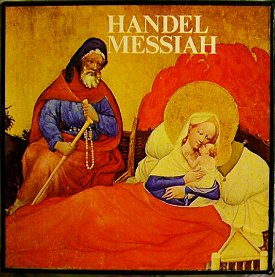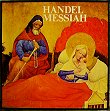
|
SITE RATING: 7/10 SITE REVIEW:
A 1971 Messiah
with the Jerusalem Chamber Orchestra conducted by Romanian-born Mendi
Rodan, with the Schola Cantorum of Oxford directed by a 25-year-old
Andrew Parrott, who would later go on to great acclaim leading the
Taverner Choir. For a 1971 recording, this
performance exhibits some of the qualities which were first evident in
Colin Davis's landmark 1966 recording: namely, smaller forces and a
markedly more stylized interpretation. Mendi's chamber orchestra
and chorus is able to create a much more nuanced, interesting reading
than what is heard on the majority of large-scale Messiahs
from the Fifties and Sixties; but Mendi doesn't adopt the brighter
tempos that Davis did; he still roots his reading is the Victorian
tradition, and the blending of the slow tempos and the pronounced
accents and musical punctuations creates a somewhat affected air - not
entirely successful, but interesting. Of
the soloists, soprano Cilla Grossmeyer is quite bright and chirpy in
her tone, and doesn't quite navigate the melismas with complete
mastery; alto Linda M. Hirst's tone is pointed and direct, with an
in-your-face attitude which is ...unusual, and a little off-putting.
Bass Willy Heparnas sings with a tepid tone and uncommitted air,
while tenor Paul W. Whitmarsh is similarly colorless - although I don't
necessarily blame the soloists for the totality of their performance -
Mendi's direction seems equally a part, notable mainly for its slow,
delberate style. The
Orchestra and Chorus are both quite good, reined in to a great degree
by Mendi's specific direction, but unified and well-blended. This
particular recording seemed to me to be a stepping stone in the
progression of performance styles which Messiah has evolved through
during the latter part of the Twentieth Century - a halfway point
between the Victorian and Baroque traditions, and an intriguing listen.
|


